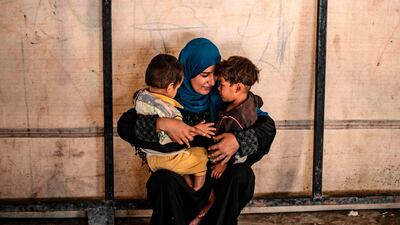Three British orphans stranded in northern Syria were given a glimmer of hope as officials explored options to ensure their safe return.
The three orphans, named Amira, Heba and Hamza, were among 24 children transferred to the relative safety of Raqqa by the British charity Save the Children after over 900 people, including 700 children, fled a camp in Ain Issa when the area came under attack by Turkish troops and their allies.
Dominic Raab, the foreign secretary, told parliament that a rescue was under consideration.
Mr Raab said the government did not want to see foreign ISIS fighters return home, but said “we will consider returns of minors and orphans”.
Save the Children has warned most of the children who fled the camp on Monday remain unaccounted for.
Many of those living in the Kurdish-secured camp at Ain Issa were supporters of ISIS, including the family members of foreign fighters killed after they joined the extremist group.
The parents of the three siblings are believed to have travelled to Syria from London in 2014 but were killed, along with four of their children, during the last fighting in Baghouz in April.
The issue of foreign fighters returning to their countries of origin has been a challenge to European leaders who fear a public backlash and the risk of renewed terror attacks at home.
The UK Home Office said however that, although it did not routinely comment on individual cases, the government’s “ultimate priority must be to protect its citizens”.
“There may be British children in Internally Displaced Persons camps in Syria who, because of their age, are innocent victims of the conflict,” a spokesperson said.
The Home Office cautioned that establishing the nationality of children in the Syrian camps can be extremely difficult.
“We look at all evidence to determine someone’s nationality and will examine every single case where we are asked for consular assistance, but this process is far from straightforward.”
Amira, 10, who speaks English with her siblings, told the BBC she had a grandmother in the UK but couldn’t remember her name.
Just four children had returned home to the UK as of July 2019, according to a report published by the King’s College International Centre for the Study of Radicalisation.
The three children have become the focal point of calls for children living in Syrian camps to be repatriated.
“Children in Syria who have fled ISIS-held areas are innocent,” said Save the Children.
“They are swept up in horrific events far beyond their control and deserve to be protected. We can and must give the British children the best chance of recovery by bringing them to the UK before it’s too late,” they said.


